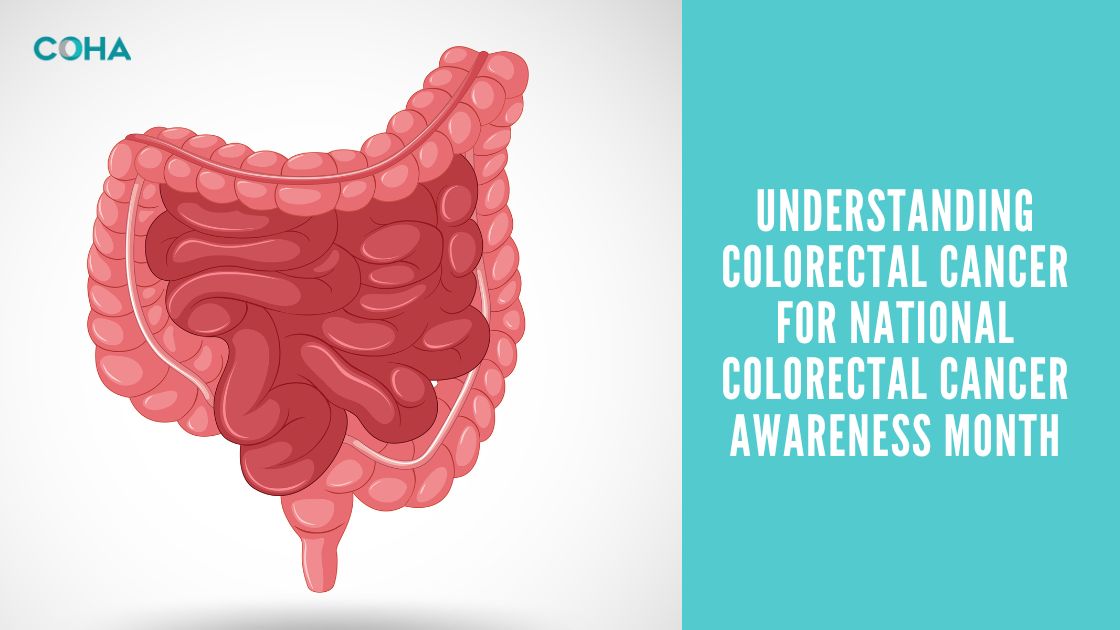


March is observed as the National Colorectal Cancer Awareness month to raise awareness about the third most common type of cancer across the world.
According to reports, an estimated 1,369,005 people in the US were survivors of colorectal cancer as of 2019, and data suggests that almost 4.1 % of the US population runs the risk of positive colorectal cancer diagnosis every year. However, if detected early, the survival rate for colorectal cancer is quite high, with the 5-year relative survival rate being 90.9%.
During this colorectal cancer awareness month, let us learn more about this disease and how to best prevent it.
Colorectal cancer is also called colon cancer and is caused by the uncontrolled growth of cells that line the colon or rectum. Colorectal cancer is categorized into several different types based on where it originates. For example, adenocarcinoma, which is the most common type of colorectal cancer, originates in the cells that produce mucus for the function of the colon and rectum.
It is crucial to get regularly checked for colorectal cancer as most of the tumors are ‘silent’ and do not cause any symptoms until they have grown quite large. Safeguarding against colorectal cancer through early detection is entirely possible with regular checkups.
The symptoms to look out for:
The risk factors for colorectal cancer:
Anyone can be diagnosed with colorectal cancer, but the risk factor increases after the age of 50. A person is also more likely to be affected by the disease if they have the following:
While it is difficult to prevent colon cancer, protect ourselves against it is possible through:
Besides lifestyle changes, regular screening can help in the early detection of colorectal cancer.
The easiest way to prevent colon cancer is to screen for it regularly after turning 45 years old. Screening entails a thorough search for pre-cancer or cancer in people who have not yet exhibited any signs of the disease. Polyps can become cancerous in about 10 to 15 years. Regular screening before that ensures that they are detected and removed before they become cancerous.
Treatment Options
In case of small tumors or polyps that have not spread, the doctor may recommend laparoscopy. A partial colectomy, where part of the colon is eliminated through surgery, may be required if the cancer has spread.
Chemotherapy or Chemo drugs may be administered orally or using an IV. They terminate cancer cells or prevent their spread. It is considered one of the best ways to reduce the spread of colorectal cancer since these drugs attack cells at various cell cycle stages. Knowing how these medications function enables physicians to foresee which medications will likely interact favorably. Based on the timing of the cell phases, doctors can also determine how frequently dosages of each medication should be administered.
Chemotherapy drugs work better on cancer cells because they frequently divide more rapidly than healthy cells.
External radiation therapy involves the use of a machine to precisely target a beam of radiation at the tumor, with no pain or discomfort experienced by the patient during the treatment process. Along with chemotherapy, radiation therapy is the most common form of treatment used to treat colorectal cancer.
This involves the use of drugs that target specific molecules involved in the growth and spread of cancer cells. These drugs can slow or stop the growth of cancer cells, and may be used in combination with other treatments, such as chemotherapy or radiation therapy, to improve outcomes for patients.
Immunotherapy is a kind of biological therapy that utilizes the patient’s immune system to battle cancer cells. This can be done through various methods, such as using immune checkpoint inhibitors, which block proteins that prevent immune cells from attacking cancer cells, or by using vaccines that stimulate the immune system to recognize and destroy cancer cells.
Support Options
Besides treatment options, colorectal cancer patients also require support and care to continue leading a normal lifestyle. Some available support options are—
The aim of this is not to cure cancer but to help preserve the morale and general well-being of the patient and to provide support to their caregivers and family. Doctors should be asked about palliative care as soon as a cancer diagnosis is made.
All cancer patients should receive ongoing treatment. Once your cancer therapy is over, follow-up care entails continuing to see a doctor for routine checkups. Blood tests and other examinations that look for changes in your health or any issues that might arise as a result of your cancer therapy may be part of these check-ups. Additionally, physical and emotional issues that could arise months or years after treatment ends are checked during these appointments. What is referred to as a “survivorship care plan” includes a summary of your cancer therapy along with your follow-up care plan. This strategy will include all the information that you and your physician should go over to make sure that you continue to receive care after your therapy is finished.
The patient or caregivers must always have at hand the following:
Any new developments, even minor ones like anxiety or a stomach ache, must be reported to the doctor.
Follow-up tests post-treatments can include:
If you are searching “cancer treatment near me” in Maryland, then Chesapeake Oncology Hematology Associates (COHA) can be your perfect guide. We are known for providing excellent colorectal cancer treatment in Maryland for over two decades. From screening and diagnosis to treatment and follow-up, our experienced team of board-certified oncologists will ensure that you receive the best possible care according to your needs. For any questions or inquiries, visit our website or contact us today.